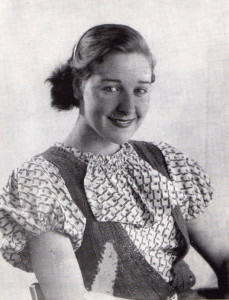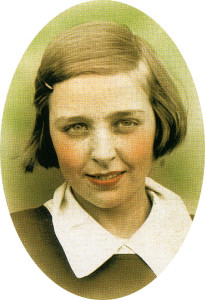
DURING the summer of 1932 I was living on hope. Our class had sat for the scholarship, and having been born in December 1921 I was ten years and five months old when I was allowed to take part. It was the time of recession. My father had been in the Navy since 1914 and stayed on because, although the money was not good, it was regular and sure.
Mother was a very good cook and catered for special dinner parties and made cakes for birthdays, anniversaries and weddings.
When we came home from school we went upstairs straight away to put our school clothes on hangers, brought our shoes down for the boys to clean and put on old clothes to do our jobs.
Both sexes helped in the garden. Grandfather did the digging, and we raked and planted, half of mother’s vegetables were potatoes (cabbage and broccoli would be planted in their place as they were lifted) and the other half were root vegetables and salad. Her herb garden was at each side of the path to the front door.
At five o’clock Mary and I laid the table and we all sat down quickly, hands washed and hair tidy, because at a quarter past five it was Children’s Hour on the radio. Mother sat at the head of the table and the radio was switched on.
Anyone talking with their mouths full would be sent to stand in the scullery until the programme had finished. Aubrey’s favourite trick was kicking under the table so that I’d stand up and shout with food in my mouth and thus be banished to the scullery.
Tea consisted of three slices of bread each with home-made jam, one slice of home-made cake, and fruit in season when this was available. We were lucky, because many children went hungry on Thursdays and Fridays until their fathers brought home the wages on Friday nights.
The girls washed up, the boys brought in coal and chopped sticks for the morning, and boots and shoes were inspected and taken upstairs. Mary and John played outside until seven, and then it was upstairs to bed.
After homework, Aubrey and I went out to play until eight. A small stream called the ‘Quaggy’ ran 25 yards from our house. Normally four feet wide, after rain this grew to six feet and it was a source of attraction to most of us.

The boys borrowed their mothers’ washing props or found palings around forbidden property then stood ten yards away, ran, planted the pole in the middle of the stream and vaulted across. The first time I saw this I thought it was the next best thing to flying. Only boys did it, or so I was told. By the time I was eight I knew I could do it if only
I could get a pole. At least I wanted to try.
One evening the boys had been jumping at various spots when someone saw some fish. I saw my chance, grabbed a pole, ran and placed the pole in the middle, but I hit a big stone, slid sideways and landed flat on my back in the water. I crawled out to chants of “Girls can’t jump”. I cried tears of temper: why can’t girls jump? Why should girls do all the silly things and boys do all
the exciting things?
The next morning at breakfast I learned my punishment: on Sunday I had to clean all the windows instead of going out to play. During gardening that evening Aubrey was still jeering at me. I saw a spade near at hand, picked it up and gave him a good clout across his arm. He had the garden fork, which he threw like a spear – straight into the back of my knee. My screams brought Mother out, and of course it was all my fault -hadn’t I caused enough trouble by behaving like a hoyden the night before?
She pulled the fork out, washed and bandaged
my leg, borrowed a pram and pushed me round to the doctor’s. It cost five shillings to call him out, and one shilling for a surgery visit. As I said, Mother was careful with money.
I had a tetanus injection and couldn’t stand for a few days. I didn’t have to clean the windows, but Aubrey did for attacking me. I didn’t jeer: I just looked self-righteous and said that at least I wouldn’t see him in Heaven.
Scholarship results were announced at the beginning of July. Aubrey had failed to get a place, but had passed for the Naval Training School on the Exmouth lying off Grays, Essex. When he came home on leave he taught me semaphore and knots. I wished girls could join: I didn’t like dolls or babies and the only doll I’d been given for Christmas had its head chopped off in a demonstration of beheading. Mother said that was the last doll I’d get, to which I replied: “Good!” and spent the rest of the day in my bedroom – plain bread and no cake. I didn’t mind because at least I could read in peace.
Reading was my passion. Forbidden books were kept behind the cistern in the lavatory. Mother had been given a full set of the Waverley Novels of Sir Walter Scott, but thought I was “a bit young yet”. Within a year, though, I’d read each one by taking them in turn from behind the cistern. Mother said most people could go to sleep in the bath, but with me it was on the lavatory. It’s just that when I get into a book I’m deaf to anything else.
At last the fateful day came, and after assembly the headmistress, Mrs. Wallace-Pierce, said she had an important announcement to make. “Flaimo Road Girls’ School had the most scholarship places awarded to one school in the whole of the London County Council area – seven.” Everyone gasped. One scholarship was normal, two very good, but seven was unheard of. Then came the names. Mine was fourth, and I didn’t hear the rest. I just hugged myself and said: “Next step, Oxford”. Teachers congratulated me, and I threw my arms around Miss Stevenson, our form mistress.
We were given 30 minutes to run home and tell our parents, Father was on leave before going to the Mediterranean for two years, he said no-one in the family had gone to high school before and that I’d better start behaving like a lady. Mother said she hoped I wouldn’t let the family down with my tomboy tricks, but I could tell they were proud.
My first option had been Aske’s haberdashers, Peckham, because it was further away from all the family ‘spies’, and my second Eltham high School. I got Eltham, but I’d been promised a bicycle if I passed, and that was a ticket to freedom. No-one else in the family had one.
During that summer holiday I raced through my morning jobs. Freda Sanford, George Hawkins, the Maquade brothers and the bigger boys all had bikes. By midday, with a bottle of lemonade and a sandwich, we were off into Kent. I can only remember sunshine, big bags of plums in my basket for Mother to make jam with, cherries looped over our ears like earrings and, later, apples and pears.
All too soon it was September. My school uniform had been bought with the grant I’d won, and my favourite Uncle Arthur gave me a leather satchel with my initials on the front. I was on my way to matriculation and Oxford.
Nothing had prepared me for the sheer snobbery of a private school that took a quota of two pupils per year on scholarship.
One girl’s grandfather was an Admiral, and when she learned my father was a leading seaman she said they were the navvies of the Navy, to which I replied she looked as if she’d be lucky if she new who her father was. This endeared me to some, but not the teacher, and from then on we were deadly enemies. I made sure I was on the opposite team at hockey and got a few good whacks in. All that summer bicycling had given me strong arms.
Today she’d be called a ‘Barbie doll’. To me she was a silly simpering spoilt Miss.
I changed to lacrosse with the help of the sports mistress, who said it would teach me more finesse and save complaints.
I was also the best swimmer. Dad had believed in everyone learning to swim: during the war he’d lost good friends when his ship was torpedoed just because they couldn’t make it to the rafts. During one of his leaves we all had to lay across kitchen chairs and practise swimming strokes for three nights before going off to the open air swimming pool in Eltham Park, and he had Aubrey and me swimming in no time. Mary did swim later but John never did.
From then on summers were spent cycling to the pool and staying there for most of the day. I shot up to 5ft. 10in. by the time I was 13, and I was a match for most boys in or out of the pool.
Betty Humphries








